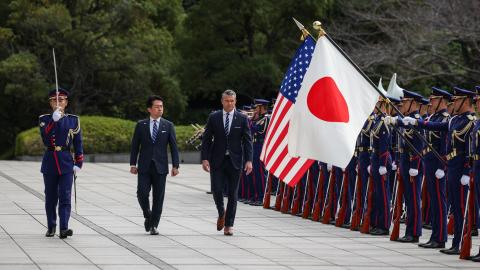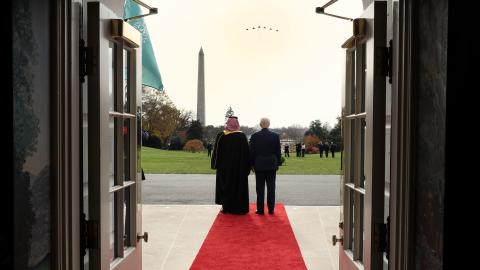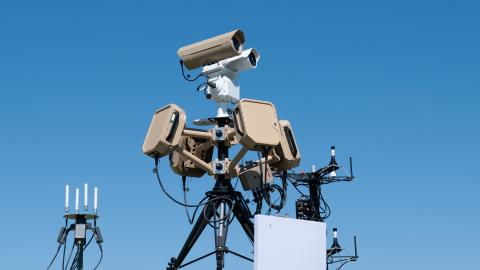Last Friday, senior Saudi leaders approached the international press privately in order to quietly denounce Iran’s president as an extremist. According to foreign-press accounts, the three Saudi officials, who asked to go unnamed, were fuming. (The Associated Press reported that the local press carried nothing of the flap.) President Ahmadinejad’s remarks in Mecca the day before denying the Holocaust and calling for Israel to be moved to Europe had upstaged a Saudi-convened summit attended by 50 Muslim nations that was intended to show a united front against — of all things — extremist thought.
Tehran had also put the Saudis on the spot back in November, when Iran’s president had called for the eradication of the Jewish state. Shortly afterwards, Saudi Ambassador Prince Turki Al-Faisal made his American debut at a friendly forum — Washington’s Middle East Institute — and someone in the room had the temerity to ask why Saudi Arabia hadn’t joined the rest of the civilized world in condemning the Iranian president’s threat against Israel. The dapper-suited ambassador replied that the Saudis preferred quiet diplomacy, adding with the tiniest hint of nationalist indignation that the Saudis wouldn’t go public just to get Western “cookies.” The nervous moment quickly passed and the ambassador moved on to regale the audience with a humorous camel-riding story involving his old pal Wyche Fowler, Clinton’s former ambassador to Riyadh and an ex-senator, who is now the institute’s chairman.
Since 9/11, the Saudi embassy has been staging a lavish public-relations campaign directed at American audiences. (The December 12, 2005 edition of The New Republic, for example, contains seven full pages of Saudi advertising.) The Mecca conference was itself part of this effort. Saudi Arabia is desperate to overcome its reputation as an incubator of intolerance and terrorism and show a moderate face.
But if it wants to score points with the West, why isn’t the House of Saud in full-throated protest against the Tehran madman? Why the “quiet” diplomacy and insistence that Saudi condemnations be unofficial and “off the record”? After all, it wasn’t just the United States, Europe, Russia, and the United Nations that openly decried Ahmadinejad — even some of his own radical Islamist allies back in Iran publicly distanced themselves from his latest provocation. Instead of seizing on the Iranian’s outburst as a golden opportunity to take a clear stand against extremism and show themselves as level-headed moderates in contrast to the reckless Shiite hardliner, the Saudis were guarded and hesitant.
The Saudis are coy for a reason. An open and unequivocal condemnation of Ahmadinejad’s outbursts by the Saudis would make them look like hypocrites to home audiences. As is well known, what the Saudis say in English differs greatly from their statements in Arabic. Wiping Israel off the map is exactly what Saudi authorities have been avowing for years to Arabic-speaking audiences. Saudi publications collected from American mosques that were translated from Arabic this year by Freedom House are replete with such statements.
In a publication produced by the Saudi press ministry, the late King Fahd is quoted:
__[W]e consider ourselves to be in a continuous war against the Zionist enemy in every way until we achieve the hopes of the Arab nation driving the occupier out.__ Another publication was produced by the Institute of Islamic and Arabic Sciences in America, a Virginia-based satellite office of a Saudi state university that, until it was raided by the FBI last year, had been staffed by over a dozen Saudi diplomats and chaired by the kingdom’s previous ambassador Prince Bandar, better known in Washington for his charm and wit. It says:
__[I]f we …give [the Jews] a document stating that they have a right to a part of Palestine under the pretense that we are impotent, the presence of the Jews will become a legal presence…. [M]y children after me will come and throw you out, or the police will come and throw you out, and the house will not remain yours just because you were a powerful thief supported by the East or the West. __
A Saudi government fourth-grade textbook collected from a New Jersey mosque warns about the dangers posed by the very concept of an “infidel” state in the midst of the Muslim world: __[Israel is intended as] a thorn in the back of the Muslim nations, and a window through which colonialism can sneak up among the ranks of the Muslims to work on dividing them and light the fire of hatred between them. [T]he Muslims will not rest until they cut off this disease and purify the land of Palestine from the plague of Zionism, and until its rightful owners reclaim it.__
The Saudis also take a mixed approach to the United States. A Saudi ad currently running in America highlights the slogans, “committed friends” and “strong allies.” Yet Arabic-language Saudi propaganda has long insisted that America is the enemy.
The Saudi publications found in the United States — from the Saudi education ministry, cultural ministry, press ministry, embassy cultural attaché, air force, and the monarchy’s own publishing houses — reflect the extreme dualistic worldview of the hard-line Wahhabi sect of Islam: There are two antagonistic realms or abodes, the Muslim and the infidel, that can never be reconciled. This means that when Muslims are in the land of the “infidel,” they must behave as if on a mission behind enemy lines while they work to create an Islamic state. Such publications direct that those who disagree in any way are to be dehumanized, discredited, and intimidated. The language, substance, and goals in these Saudi materials are the same as those articulated by Ahmadinejad and al-Qaeda.
Booklets published in Arabic for the "Immigrant Muslim" by the Saudi embassy in Washington, for example, instruct Muslims to “hate” Americans. They counsel that, because America is ruled by infidel civil law, “it is forbidden” for a Muslim to become an American citizen, or join the U.S. military, or support Americans in any way.
The Saudi government exploits its position as custodian of Islam’s two holiest shrines, asserting that its rulings and interpretations of the faith are the authoritative ones. Muslims who fail to follow these dictates — whether they are Shiites, Sufis, or anyone else — are condemned as apostates. And, as another ministry of Islamic affairs book bluntly threatens its Muslim reader, if you become an unbeliever and fail to repent, “you should be killed.”
Such publications, distributed not only in the United States but around the world, are merely one part of Saudi Arabia’s Wahhabization campaign. It spreads its ideology through its sponsorship of schools, mosques, imams, media outlets, cultural centers, and websites. A Treasury official told Congress that Saudi Arabia is the “epicenter” of Islamic extremism. Witnesses at a recent Senate hearing on the Saudi Accountability Act estimate that the Saudis expend three times as much as the Soviets did on external propaganda during the height of the Cold War. The late King Fahd’s website continues to provide a long roster of names of American universities, mosques, and other sites in the U.S., Europe and elsewhere that have benefited from his generosity. As Mayor Giuliani knew when he returned the $10 million check from Saudi Prince Talal after September 11, these donations come with strings attached.
In the last six months, the State Department and some in the media have begun to question the House of Saud about its noxious Arabic propaganda. Saudi Arabia’s official response is, in the words of one of its recent ads, that “the State is proceeding in its gradual and studied course of reform.”
So gradual is its studied course that it’s imperceptible. Extremism remains the order of the day in Riyadh, staged summits and public-relations campaigns notwithstanding.
At the same time that the ads appeared in November, the Saudi Al-Madina newspaper reported that one brave Muslim teacher in Saudi Arabia by the name of Mohammad al-Harbi was sentenced to 750 lashes and a three-and-a-half-year prison term for making positive statements about Jews and the Bible. Such religious tolerance is forbidden, according to the Saudi publications we found, because it“breaks the wall of resentment between the Muslims and the unbelievers.”
Early last week, Prince Talal was back in the news. Attending an Arab media conference in Dubai, he admonished fellow Arabs to be more “pro-active” in influencing the American media. By week’s end, Saudi officials were working to put spin on the Mecca conference debacle. But they still think they can have their cake and eat it too.
America is not the tightly controlled world of the Middle East. After 9/11, we are taking a closer look at those who claim to be our friends. And we know that friends don’t call friends “infidels,” in any language. If the Saudi public-relations campaign is to succeed in improving that country’s image, the House of Saud needs to disavow its own message of religious hatred and intolerance.
















